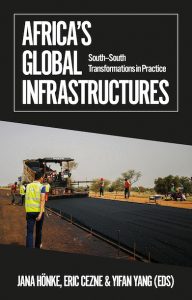The Infraglob team is delighted to announce the release of the book Africa’s Global Infrastructure. Resulting from research conducted within the project, this volume is co-edited by Jana Hönke, Eric Cezne, and Yifan Yang. However, the book itself is a global project. We thank our authors –from Africa, Asia, South America, and Europe—for beautiful chapters, and for their engagement over the course of two workshops under the conditions of the pandemic, a joint panel and throughout the review process.
The manuscript is published in the African Arguments series edited and distributed by Hurst and Oxford University Press, to whom we are grateful for this collaboration.

The book is a bottom-up account of how South-South infrastructure projects impact African politics and societies but also transnational practices of governing economic hubs in an increasingly polycentric world order.
The boom in South–South relations since the early 2000s has seen a flurry of investment in African infrastructure from emerging markets across the Global South. While the extent to which these projects spur growth is constantly debated, few studies have addressed their impact on ground-level political and socio-economic practices in Africa and their consequences for transnational governance more broadly.
Through the lens of infrastructure, this book investigates the developmental ideas, processes and techniques that have travelled to and emerged from Africa as a result of Global South–led projects. How have they been adapted, transformed and contested by local actors? How does this shape business–society relations? And how has this transform Western-dominated transnaitonal governance? The contributors zoom in on large-scale Chinese-, Brazilian- and Indian-funded ventures—dams, ports, roads and mines—across countries including Kenya, Mozambique and the DRC. These ‘frontier zones’, bringing together politicians and practitioners, campaign groups and communities from Africa and elsewhere, offer a unique insight into the global workings of our contemporary world.
Taking a bottom-up approach, Africa’s Global Infrastructures explores the longer-term significance and implications of these pluralistic socio-economic interactions, for the continent and beyond.
The chapters are grouped around three thematic sections: models, contestations, and everyday encounters, each section addressing a distinct set of questions:
-
- Models: Do Global South actors bring along new models and practices of project management and engagement with host societies and how are they shaped by home state elites and political institutions?
- Contestations: How are corporate and state practices around South-South investment contested, and are they contested differently? How are tactics deployed and adapted to shift power dynamics – in Africa and across the Indian Ocean and the South Atlantic – and to what effect?
- Everyday encounters: What global workplace and business-community relations characterize South-South projects and how have they evolved over time?
The entire Infraglob team wishes you happy reading!

